Republicans Lick Chops While Revving Up To Dismantle The Endangered Species Act
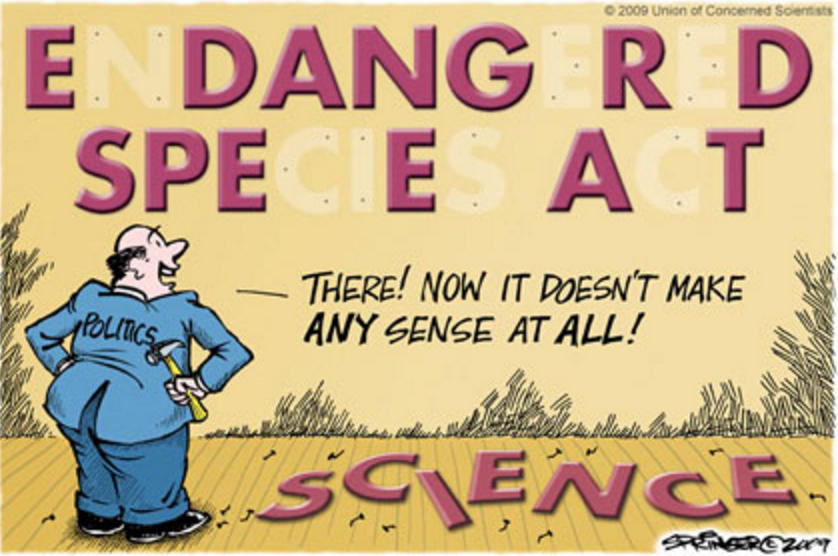
(EnviroNews Nature) — Washington D.C. — On Feb. 15, 2017, the U.S. Senate Environment and Public Works Committee (EPW) held a hearing called, “Oversight: Modernization of the Endangered Species Act.” Sen. John Barrasso (R-WY), Chairman of the EPW, held this two-hour hearing to explore “the need to modernize the ESA in order to better improve recovery rates and the eventual delisting of recovered species.”
Experts in species and habitat conservation have spoken out against this proposed “modernization” as a thinly cloaked attempt to dismantle an essential and publicly supported piece of environmental legislation — while opening up ecologically “critical” lands for industrial development.
Mike Danylak, a spokesman for Barrasso and the EPW, told EnviroNews Nature:
Counties, wildlife managers, homebuilders, construction companies, farmers, ranchers, and other stakeholders are advocating for a number of measures to modernize the ESA, like placing an increased emphasis on fully recovering species that are listed as endangered or threatened to the point that they can be delisted, and improving the U.S. Fish and Wildlife Service’s consultation with the states regarding listing and delisting decisions.
On the other hand, Erik Molvar, Executive Director of the Western Watersheds Project, shared a conservationist’s point of view with EnviroNews:
If Congress opens up the Endangered Species Act for tinkering, then every anti-environmental lobby group will be trying to get in and carve out the regulations that prevent their industry from driving rare wildlife extinct.
This legislative effort isn’t about ‘reforms’ or ‘improvements, it’s about fundamentally gutting one of our nation’s most important bedrock conservation laws and replacing science-based decision-making with political horse-trading that sells out our endangered wildlife. Corporate interests want to make it legal to drive rare plants and wildlife extinct. It’s as simple as that.

One of the main concerns Barrasso mentioned in his remarks to the committee was, “of 1,652 species of animals and plants in the U.S. listed as either endangered or threatened since the law was passed in 1973, only 47 species have been delisted due to recovery of the species.” Barrasso said for this reason, the ESA “is not working today.”
But Noah Greenwald, the Center for Biological Diversity’s Endangered Species Director, explained Barrasso’s argument, is a flawed one. Species take decades to reach near extinction and decades of consistent conservation efforts to then be restored. The persistent issue of habitat encroachment further slows down and hinders the recovery process.
“Since entering the Senate in 2008, [Barrasso] has voted against endangered species protections at nearly every chance he got.” Greenwald added. He also pointed out that Barrasso has received significant campaign contributions from the oil and gas industry.
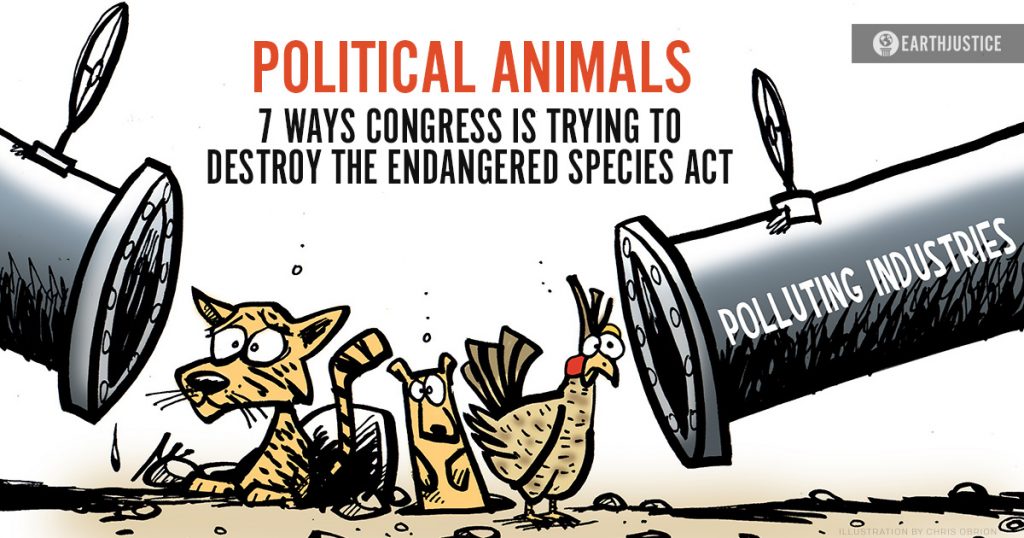
The ESA was signed into law in 1973 by President Richard Nixon and its purpose is, in part, “to provide a means whereby the ecosystems upon which endangered species and threatened species depend may be conserved,” and “to provide a program for the conservation of such endangered species and threatened species.” A 2013 poll carried out by the Center for Biological Diversity found two-thirds of Americans support the ESA.
WildEarth Guardians explained the ESA is essential because, “the current extinction rate is at least 1,000 times the historical rate indicated by the fossil record. This mass extinction crisis is due to habitat destruction, climate change, pollution, exploitation, proliferation of non-native species and other threats.”
By saying the ESA simply doesn’t work, environmentalists claim Barrasso ignores the ways in which it is fulfilling its stated mission: to conserve endangered species and their ecosystems. The ESA now protects more than 1,600 animal and plant species. The U.S. Fish and Wildlife Service (USFWS), the principal federal partner responsible for administering the ESA along with the National Marine Fisheries Service, reported, “98 percent of all species listed as either endangered or threatened under the ESA still survive.”

The ESA is well-known for saving the humpback whale (Megaptera novaeangliae) and the bald eagle (Haliaeetus leucocephalus) from extinction and also works to protect many less charismatic organisms, including snails, plants, fish, and mollusks that each play a vital role in maintaining diverse, thriving American ecosystems. The recovery of bird species in the continental U.S. is another example of the ESA’s success, as 85 percent of listed bird populations either increased or stabilized after receiving ESA protection.
A Center for Biological Diversity report analyzing the ESA’s budget needs found the Act has been “chronically and severely underfunded.” The report offers extensive evidence of this, such as that 25 percent of species protected under the ESA were allotted “less than $10,000 in recovery funding in 2014, the last year for which data is available” and “43 species received less than $1,000 each.” The report recommends the ESA’s budget rise from $82 million in 2016 to about $2.3 billion over 10 years and points out this is “about the same amount that’s given to oil and gas companies to subsidize extraction of fossil fuels on public lands.”
Jim Kurth, newly-appointed Director of USFWS, requested $1.6 billion for the Service’s entire 2017 Fiscal Year budget and $89.2 million for ESA “recovery activities.” He stated a portion of those funds “will support continued evaluation of nearly 50 species that have been identified for potential delisting or down listing from endangered to threatened under the Endangered Species Act.” He outlines the ESA’s recent successes in the budget statement, including the recovery and de-listing of the first fish ever, the Oregon chub (Oregonichthys crameri).
House Natural Resources Chairman Rob Bishop (R-Utah) is another outspoken opponent of the ESA. Bishop participated in the 2013-14 House ESA Working Group. This group’s recommendations for modernizing the ESA include a focus on “species recovery and de-listing,” “reducing ESA litigation,” empowering “states, tribes, local governments and private landowners” on ESA decisions that affect them and seeking “transparency and accountability of ESA data and science.”
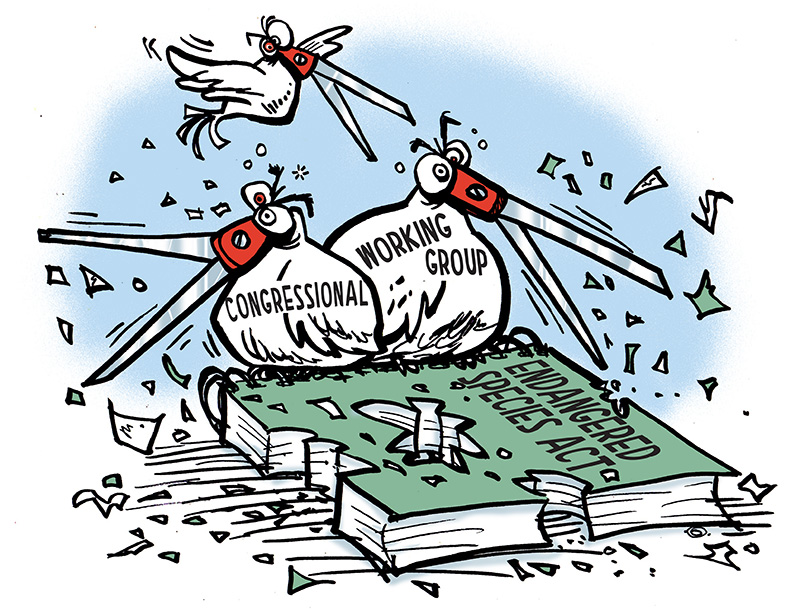
In 2014, Bishop described the ESA as an originally “noble” act, which “since its introduction in 1973, [has] been coopted by activist special interest groups as a tool to snuff out multiple use of our lands and resources.” In 2016, Bishop said he would be happy to “invalidate” the ESA.
Video of terrible Utah Representative Rob Bishop admitting that he'd like to invalidate the Endangered Species Act https://t.co/QIq1hRp6um
— Noah Greenwald (@Noah_Ark_757) December 8, 2016
Many bills and backdoor riders have been introduced in the past to weaken the ESA, and Barrasso and Bishop have each sponsored seven of them. Numerous court cases have been filed regarding the listing or delisting of species. Notably, in 2011, after the Service built up an extensive backlog of endangered species petitions, a decade long legal battle with WildEarth Guardians and the Center for Biological Diversity ended in a landmark settlement. The agreement required the Service to move forward with ESA designations for approximately 800 species that had been previously hanging in the balance. Also through the settlement, over two million acres and over 6,000 stream and river miles were protected as critical habitat. The Service’s budget shortfalls were a central issue during this monumental case.
In 2016, The Western Governors’ Association (WGA) called for a clearer ESA focus on recovering species and making states “full partners in listing, critical habitat and recovery decisions.” They also called for an increase in funding for the ESA itself, as well as for “economic incentives for landowners to participate in conservation efforts.”
Former USFWS Director Daniel Ashe testified during the Feb. Senate hearing that he supported the WGA’s resolution and thinks bipartisan communication “is obviously what is going to happen and will need to happen if we are going to have an effective debate about the future of the Endangered Species Act.”
Earthjustice elucidated that during the current 115th Congress, various legislative attacks on the ESA call for “arbitrary land boundaries where species protections would not apply and …limitations on the ability of citizens to help enforce the Endangered Species Act, undermining the use of science under the Endangered Species Act, [and] declaring open season on individual species, including wolves (Canis lupus) and greater sage grouse (Centrocercus urophasianus), by blocking federal protections or denying existing protections.”

For example, Rep. Bishop tried to block the USFWS’s ability to even make a decision on the sage grouse for a decade, while the bird’s numbers were in steep decline. Bishop attempted this via a backdoor rider, buried deep within the National Defense Authorization Act (NDAA) – an annual, must-pass military spending bill. The provision was eventually removed, but many other attempts to block a listing on sage grouse and other species have been attempted by Republican lawmakers in un-related, must-pass appropriation bills.
Rep. Pete Olson (R-TX) introduced H.R.717, which would prioritize the economic cost of species being listed. The bill states:
“The appropriate department is given the authority to preclude the listing of a species as threatened due to the likelihood of significant, cumulative economic effects that would result from such listing or from the likely resulting designation of critical habitat of the species.”
Sen. John Cornyn (R-Texas) introduced S. 375, which would give “local governments, Big Oil, Big Agriculture and other industries the right to veto settlement agreements requiring the [Service] to make decisions about the protection of endangered species,” according to the Center for Biological Diversity.
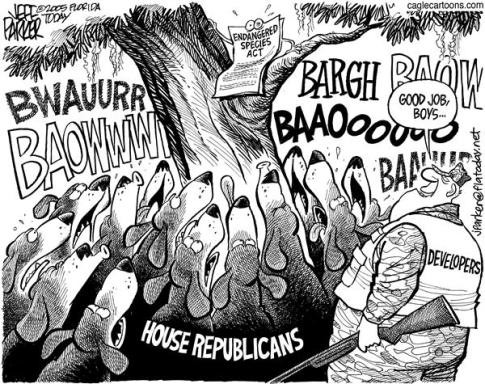
National Geographic explained, “foes of the [Act] now see an opportunity to weaken it under President Donald Trump.” Trump has been an opponent of the environment at every turn, cutting out protective regulations that might prevent business development, particularly in the energy arena. In his first few weeks, he reopened fossil fuel pipelines, prevented bumble bee protections, removed a rule safeguarding water from coal pollution, appointed an EPA opponent to the Agency’s top post and ordered a new wall along the U.S.-Mexico border that will directly threaten endangered species.
At this critical juncture, “we need our progressive champions to start swinging to hold firm on Republican-led attempts to weaken [the ESA] in the name of ‘modernization,’” Amy Atwood, Endangered Species Legal Director and Senior Attorney at the Center for Biological Diversity, told EnviroNews Nature. “It’s in their interest to do so, given the Act’s huge popularity with the public.”
In 2015, the Union of Concerned Scientists (UCS) carried out a survey of 7,000 scientists at four federal agencies including the USFWS. The UCS asked the scientists about “scientific integrity, communications and agency effectiveness.” Seventy-three percent of USFWS respondents “reported too much weight given to political interests.”
“It is my perception that upper-level managers are influenced by fear of Congress dismantling the Endangered Species Act and/or otherwise interfering with the mission of the Service,” one anonymous USFWS scientist said. The report recommended the USFWS “work to improve scientific integrity practices and minimize political interference in scientific decision making throughout the agency.”
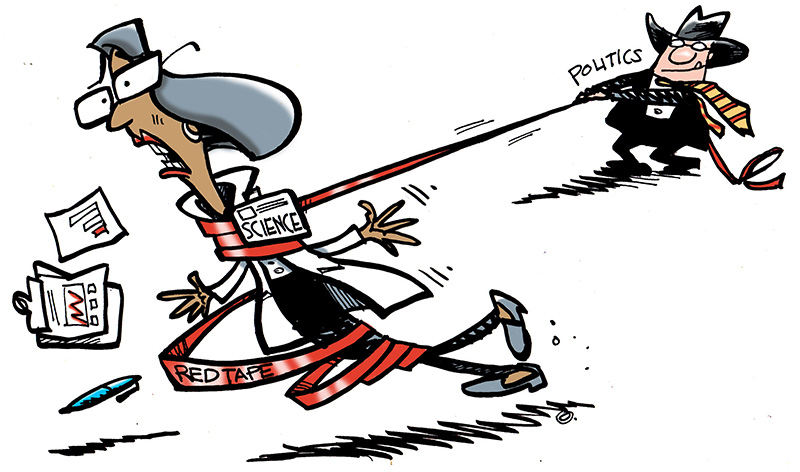
In 2016, the USFWS released an update to its peer review policy for ESA listings. UCS reported the new policy took significant “steps toward more robust and transparent peer-review” but could still be stronger. For example, the policy is vague about when the new peer-review process “will be necessary versus not.”
The White House responded but declined to provide a comment on ESA modernization. EnviroNews is yet to receive a response from Bishop, whose office said he was unavailable for comment.
Endangered Species Act
(null)
(null)
OTHER GREAT ENVIRONEWS REPORTS ON THE ENDANGERED SPECIES ACT AND THREATENED WILDLIFE
WildEarth Guardians Sues Colorado over Plan to Kill Black Bears, Mountain Lions
(EnviroNews Nature) – Denver, Colorado – The Colorado Parks and Wildlife Department (CPW), the Colorado Parks and Wildlife Commission (Commission) and the Colorado Department of Natural Resources are being sued by WildEarth Guardians (WEG) for their December approval of two predator-killing programs. Through the Piceance Basin Predator Management…
After a Century, ‘Landmark Settlement’ Puts Brakes on Federal Government’s ‘Rogue’ Wildlife-Killing Program
(EnviroNews Nature) – Missoula, Montana – Well, it only took a century, but it has happened at last: Something finally put the brakes on Wildlife Services (WS), the U.S. Department of Agriculture’s (USDA) “secretive,” “rogue,” “cruel” wildlife-killing agency – and that “something” is the environmental non-profit organization WildEarth…
‘Secret’ Federal Agency Admits Killing 3.2 Million Wild Animals in U.S. Last Year Alone
(EnviroNews DC News Bureau) – Washington D.C. – The United States Department of Agriculture’s (USDA) Wildlife Services (WS) admitted in its annual Program Data Report to having killed at least 3.2 million wild animals in 2015 alone – many of which were large predators. 1,681,283 of that total…
Report: 86% of North America’s Bird Species Struggling or in Crisis – 33% Facing Extinction
(EnviroNews Nature) – One in three North American bird species are of “high concern” to conservationists with an additional 50% struggling badly, according to the North American Bird Conservation Initiative (NABCI). The group’s annual report The State of North America’s Birds 2016 makes for grim reading by suggesting…
POLL CLOSED: Should USDA’s Secretive Wildlife Killing Program Be Abolished? Yes/No – VIEW RESULTS
(EnviroNews Polls) – 3.2 million animals. That is the amount of critters and creatures brutally eradicated by Wildlife Services (WS) in America last year alone, by way of traps, snares, bullets and poisons – all with your tax dollars of course (at least if you are a U.S….
Five Environmental Groups Sue USDA Over Idaho Wolf-Killing Program
(EnviroNews Idaho) – Boise, Idaho – On June 1, 2016, five prominent environmental organizations filed a lawsuit in federal district court against the United States Department of Agriculture’s (USDA) Wildlife Services for killing over 650 wolves in the state of Idaho over the past decade. Wildlife Services is…
Federal Government Sued For Killing Wolves in Oregon
(EnviroNews Oregon) – Five environmental groups filed a lawsuit on February 3, 2016, in U.S. District Court against the federal agency Wildlife Services, over what they say is the illegitimate killing of wolves in the state of Oregon. WildEarth Guardians, Center for Biological Diversity, Predator Defense, and Project…
Federal Judge Orders Stop to Canadian Lynx Trapping in Idaho
(EnviroNews Idaho) – Boise, Idaho – A federal judge has ordered a stop to the haphazard trapping of Canadian Lynx in Idaho. Lynx canadensis, as it is scientifically known, is one of the rarest cats in the United States and has been captured multiple times in Idaho over…
Feds Attempting to Strip Yellowstone Grizzly Bear of Endangered Species Act Protection
(EnviroNews Wyoming) – Missoula, Montana – In a move that has angered environmentalists and wildlife enthusiasts, the U.S. Fish and Wildlife Service (USFWS) proposed on March 3, 2016, to strip the iconic Greater Yellowstone Ecosystem (GYE) grizzly bear of its protected status under the Endangered Species Act (ESA),…
Poll Closed: Should U.S. Government Maintain a Wolf-Killing Program? Yes or No? – View Results
(EnviroNews Polls) – In December of 2015, several environmental groups, spearheaded by WildEarth Guardians, won a pivotal lawsuit against Wildlife Services, a U.S. Department of Agriculture (USDA) agency, for its wolf-killing program in Washington State. On February 3, 2016, WildEarth Guardians, in concert with four other groups, filed…
No Endangered Species Act Protection for Sonoran Desert Tortoise, Interior Announces
(EnviroNews Arizona) – Washington D.C. – The Morafka’s, or Sonoran desert tortoise, or Gopherus morafkai as it is scientifically known, is a slow moving, yet ancient creature that gets its water from eating native plants while spending most of its time in underground insulated burrows that it digs…
POLL: Should Yellowstone Grizzly Bear Be Delisted, Hunted and Killed? Yes/No? (Feds Say Yes)
(EnviroNews Polls) – On March 3, 2016, the United States Fish and Wildlife Service (USFWS) proposed a new rule that would delist the Greater Yellowstone Ecosystem (GYE) grizzly bear, and advocate the hunting and elimination of at least 200 of the region’s approximately 715 specimens. The move fueled…
Will Redrawing Core Sage Grouse Areas in Wyoming Help Save the Bird From Extinction?
(EnviroNews Wyoming) – Douglas, Wyoming – In late April a gloomy report was issued by Pew Charitable Trusts that claims there is a 98.7 percent chance greater sage grouse will go extinct in Wyoming’s Powder River Basin in 30 years if the current course continues. The Powder River…
Dept. of Interior: No Protection for Greater Sage Grouse Under Endangered Species Act
(EnviroNews DC News Bureau) – Commerce City, Colorado – On the morning of Tuesday August 22, 2015, Department of the Interior (DOI) Secretary Sally Jewell announced that Centrocercus urophasianus, a.k.a. greater sage grouse, will not receive protection under the Endangered Species Act (ESA). A decision by U.S. Fish…
ALERT: GOP Attempting to Kill Environmental Regs Across The Board With Sneaky Budget Riders
(EnviroNews World News) – Washington, DC – It seems like we, at EnviroNews, have been reporting on this type of thing all year. That is, sketchy environmental riders being attached to totally unrelated appropriations bills in backdoor efforts to kill environmental and wildlife protections. Yes, this year’s spending…
Obama Administration Comes Out Against NDAA Sage Grouse Rider
(EnviroNews DC News Bureau) – Washington DC – In a surprising environmentally-friendly move today following the Department of the Interior’s green light for Shell Oil Company’s arctic drilling ambitions yesterday, the Obama Administration came out against a controversial rider in the 2015 National Defense Authorization Act (NDAA) that…
Sec. Sally Jewell Announces DOI Will Not List Bi-State Sage Grouse as Endangered
(EnviroNews Nevada) – Reno, Nevada – To the dismay and disappointment of environmentalists, conservationists and biologist alike, Department of the Interior (DOI) Secretary Sally Jewell announced on April 21, 2015 (which also happened to be Earth Day) that the bi-state sage grouse will not be making its way…
WA State Stops Bloodshed After Massacring Profanity Peak Wolf Pack To Appease Cattle Ranchers
(EnviroNews Washington) – Olympia, Washington – The Washington Department of Fish and Wildlife (WDFW) announced October 19, 2016, that it would spare the remaining four members of the now demolished Profanity Peak Wolf Pack, after already having killed seven of its wolves (Canis lupus) to appease cattle ranchers….
WildEarth Guardians: DOI’s Bi-State Sage Grouse ‘Conservation Success’ Is ‘Window Dressing’
(EnviroNews Wyoming) – Douglas, Wyoming – On April 21, 2015 Secretary of the Department of the Interior (DOI) Sally Jewell appeared in Reno, Nevada to make a pivotal Bi-State Sage Grouse Announcement: No protection under the Endangered Species Act (ESA) for the bi-state distinct population of the greater…
FILM AND ARTICLE CREDITS
- Julia Travers - Journalist, Author


![Leading the Charge for America’s Wild Horses on Capitol Hill: NBA/NFL Celeb. Bonnie-Jill Laflin: ‘[Politics] won’t stop us from fighting’](https://cf-images.us-east-1.prod.boltdns.net/v1/static/1927032138001/f46b2158-cead-47f0-ab44-4b027059411a/4e4afcf2-937d-4a9d-acba-1b82e2efd4c6/160x90/match/image.jpg)


